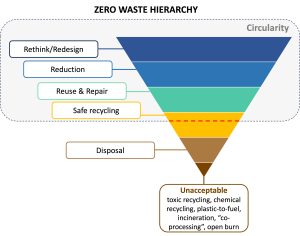
July 29, 2024
The circular economy will be an important, if not the decisive source of raw materials for the European economy after 2030. This applies not only to the supply of metals, but also to non-fossil carbon. What about the fossil carbon in the stock (plastics)? Only if it is recycled will it not have a climate impact. However, there is currently no reliable data available on the substitution of virgin plastics with recyclates (closed loop recycling) for the relevant plastic application areas (packaging, construction products, waste electrical and electronic equipment, vehicles). In our opinion, the feedstock change (“defossilisation”) in the plastics and chemical industry that is necessary from a climate policy perspective can only succeed if physical and chemical recycling is focussed on substituting “virgin plastic” in the future. The additives contained in long-lasting plastic products pose a problem here. Many of these substances are now banned or strictly regulated (legacy additives). The additives are usually recycled together with the material during mechanical recycling. The data on the contamination of recyclates from used plastics with hazardous or banned substances is a cause for concern. Based on the data available and its toxicological assessment, we recommend a moratorium on the use of recyclates for products with a high “user proximity” (contact-sensitive products like food packaging, kitchen utensils, toys, textiles, indoor products). Recyclates from closed, monitored product cycles should not be subject to this moratorium. the article by Uwe Lahl, Dirk Lechtenberg and Barbara Zeschmar-Lahl was published today in the journal Österreichische Wasser- und Abfallwirtschaft (2024), 76, 7–8.
